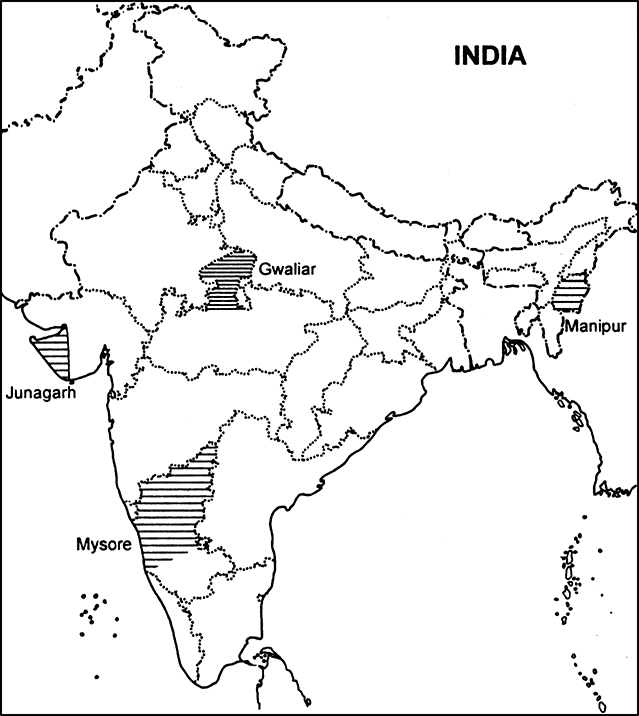
Bismay : The merger with the Indian State was an extension of democracy to the people of the Princely. States.
Inderpreet: I am not so sure, there was force being used. Democracy comes by creating consensus.
What is your own opinion in the light of accession of Princely States and the responses of the people in these parts ?
While, it is correct that force was used but that was necessitated due to the prevailing circumstances of that time in the states like Hyderabad where a paramilitary force known as the Razakars whose communal atrocities knew no bound. They murdered, maimed and raped targeting particularly non muslim. Hence, the army was sent to control the Nizam's forces. This led to Hyderabad's accession to India.
Take a current political map of India (showing outlines of states) and mark the location of the following Princely States:
(a) Junagadh
(b) Manipur
(c) Mysore
(d) Gwalior

“Today you have worn on your heads a crown of thorns. The seat of power is a nasty thing. You have to remain ever wakeful on that seat...... you have to he more humble and forbearing... now there will be no end to your being tested. ” – M.K Gandhi
“... India will awake to a life of freedom....we step out from the old to the new...we end today a period of ill fortune and India discovers herself again. The achievement we celebrate today is but a step, an opening of opportunity... ” – Jawaharlal Nehru
Spell out the agenda of nation building that flows from these two statements. Which one appeals more to you and why ?
According to M.K.Gandhi, there were different challenges of nation building viz. to shape a united nation, to establish democracy and to ensure the development and well-being of the entire society and not only of some sections. The problems would have arisen again and again had we been not been humble and forbearing to solve those problems. It was a fact because the partition led to one of the largest, most abrupt, unplanned and tragic transfer of population that human history has known. It was a test for the Indian leaders as their rehabilitation was not an easy task and there was a crown of thorns on their heads.
Whereas for Jawaharlal Nehru, freedom of India was only a step. There were problems of poverty, unemployment, rehabilitation of people, harmony among people and establishing democracy but freedom has given an opportunity to solve them.
The agenda of Gandhi appeals to me because it deals with the problems as a crown of thorns and advises the leaders to remain ever wakeful on the seat of power. It advises them to be humble and forbearing.
D.
The scheme of Partition included a plan for transfer of population across the border.| A. Mapping of boundaries on religious | (i) Pakistan and Bangladesh grounds |
| B. Mapping of boundaries on grounds of | (ii) India and Pakistan different languages |
| C. Demarcating boundaries within a | (iii) Jharkhand and Chhattisgarh country by geographical zones |
| D. Demarcating boundaries within a country | (iv) Himachal Pradesh and Uttarakhand on administrative and political grounds |
A. Mapping of boundaries on religious | (i) India and Pakistan different languages |
B. Mapping of boundaries on grounds of | (ii) Pakistan and Bangladesh grounds |
C. Demarcating boundaries within a | (iii) Himachal Pradesh and Uttarakhand on administrative and political grounds |
D. Demarcating boundaries within a country | (iv) Jharkhand and Chhattisgarh country by geographical zones |
